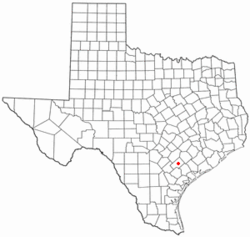Cuero, Texas
| Cuero, Texas | |
|---|---|
| City | |

Cuero Commercial Historic District
|
|
| Motto: History, Heritage, Hospitality | |
 Location of Cuero, Texas |
|
 |
|
| Coordinates: 29°5′37″N 97°17′28″W / 29.09361°N 97.29111°WCoordinates: 29°5′37″N 97°17′28″W / 29.09361°N 97.29111°W | |
| Country | United States |
| State | Texas |
| County | DeWitt |
| Area | |
| • Total | 4.9 sq mi (12.8 km2) |
| • Land | 4.9 sq mi (12.8 km2) |
| • Water | 0.0 sq mi (0.0 km2) |
| Elevation | 184 ft (56 m) |
| Population (2010) | |
| • Total | 6,841 |
| • Density | 1,386/sq mi (535.0/km2) |
| Time zone | Central (CST) (UTC-6) |
| • Summer (DST) | CDT (UTC-5) |
| ZIP code | 77954 |
| Area code(s) | 361 |
| FIPS code | 48-18092 |
| GNIS feature ID | 1377543 |
| Website | www |
Cuero (/ˈkwɛroʊ/ KWAIR-oh) is a city in DeWitt County, Texas, United States. The population was 6,841 at the 2010 census. It is the county seat of DeWitt County. It is unofficially known as the "turkey capital of the world" (this is reflected in the Cuero High School mascot, the Gobblers). In 2010, Cuero was named one of the "Coolest Small Towns in America" by Budget Travel magazine.
The city of Cuero had its start in the mid-19th century as a stopping point on the Chisholm Trail cattle route to Kansas. However, it was not recognized as a town until 1873, when it was officially founded. The city was named for the Spanish word meaning "hide", referring to the leather made from animal hides. The industry was extremely short-lived, however, and gave way to various forms of ranching. The city had several Old West gunfights related to clan feuding following the Civil War
Cuero's population grew considerably in the 1870s and 1880s, as residents from the coastal town of Indianola, Texas, settled here after major hurricanes in this period destroyed sizeable portions of that city. Cuero thrived through much of the late 19th and early 20th centuries by the introduction and practice of turkey ranching in the area. Today, agriculture is still the primary industry in the region. Cuero is considered to be one of the top cattle producers and shippers in Texas.
Cuero is located east of the center of DeWitt County near the mouth of Sandies Creek, where it empties into the Guadalupe River.
...
Wikipedia
